The Russian Mind

Russia’s long history of resilience and collectivism offers profound lessons on enduring challenges while staying connected to a larger whole. Exploring the Russian Mind illuminates how strength, community, and deep emotional connections shape personal and cultural identities.
In the Russian context, inner strength and Compassion intertwine uniquely, emphasizing endurance and self-sacrifice for the greater good. This reflects key AURELIS principles: openness to others, depth of inner growth, and respect for both individual and communal values.
Cultural Overview
Philosophy and Worldview
Russian collectivism emphasizes unity, endurance, and a shared sense of purpose. Historically shaped by communal survival during adversity, this worldview fosters a deep connection to one’s community and a sense of responsibility to contribute.
Key Characteristics
- Communication Style: Emotional depth and philosophical nuance. Russians value sincerity and often speak with a blend of directness and introspection.
- Traditions and Societal Values: Strong family bonds, respect for elders, and the importance of collective well-being over individual desires.
- Cultural Symbolism: Icons like the birch tree symbolize resilience and renewal, while classic Russian literature explores existential depth and morality.
Visual and Literary Culture
The works of Tolstoy and Dostoevsky epitomize the Russian Mind, delving into themes of redemption, suffering, and the human spirit. A proverb like “He who does not risk, does not drink champagne” reflects courage and the acceptance of life’s struggles.
Is the Russian Mind a Compassionate Mind?
Compassion in Russian culture is deeply intertwined with endurance and sacrifice. It is often expressed through acts of support for family, friends, and the community, even when personal hardship is involved. This reflects a profound sense of interconnectedness and responsibility.
Aurelian Coaching in Context
Alignment with AURELIS Principles
- Russian resilience aligns with the Aurelian focus on inner strength, showing how individuals can draw from personal depths to sustain their communities.
- Collectivism emphasizes interconnectedness, resonating with the Aurelian principle of Compassion as both inward and outward.
Challenges and Opportunities
- While endurance is a strength, it may lead to neglect of personal self-care. AURELIS coaching can help balance resilience with nurturing individual well-being.
Applications for Coaching
Practical Coaching Approaches
- Autosuggestion Focus: Sessions that encourage balancing resilience with self-care, fostering emotional renewal and openness to change.
- Guidance: Coaching can use Russian storytelling traditions to inspire personal growth and inner strength.
Key Questions or Exercises
- Reflective Question: “How can you honor your commitment to others while caring for your own inner needs?”
- Exercise: Visualize yourself thriving while contributing to a supportive and balanced community.
Cultural Perspectives in Comments
Likely Dynamics
Russian commenters might focus on shared struggles, expressing themselves with emotional intensity or deep philosophical reflections. Conversations may highlight themes of endurance, justice, and communal values.
Lisa’s Moderation Approach
- Acknowledge emotional depth in comments while guiding discussions toward shared insights.
- Encourage participants to connect their experiences with universal themes like resilience and Compassion.
Most Distinctive Characteristics of the Russian Mind
Strengths
- Resilience and a profound ability to endure hardships.
- Deep emotional connections and loyalty to family and community.
Challenges
- A tendency to prioritize the collective over individual needs, potentially leading to burnout or emotional suppression.
Intercultural Insights
What This Culture Teaches Us
Russia’s ability to thrive in adversity offers valuable lessons on fostering inner strength and finding purpose through community.
What Russia Can Learn from the Aurelian Mind
The Aurelian focus on balancing inner Compassion with outward resilience can help Russians nurture their personal well-being without diminishing their collective values.
Conclusion
Encouraging Cross-Cultural Understanding
The Russian Mind demonstrates the beauty of endurance and shared purpose. By integrating AURELIS principles, we can find a balance between personal growth and communal care, fostering unity and deeper understanding across cultures.
Reflective Takeaway
“What does endurance mean to you, and how can it deepen your connection to yourself and others?”


